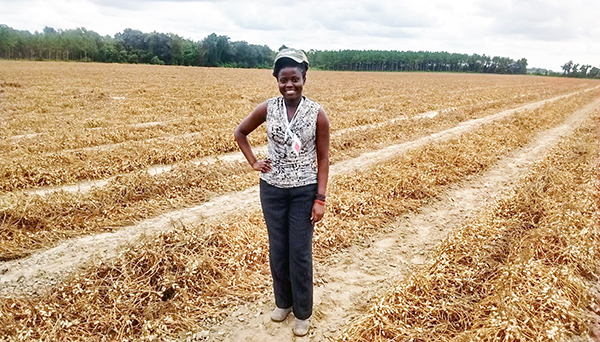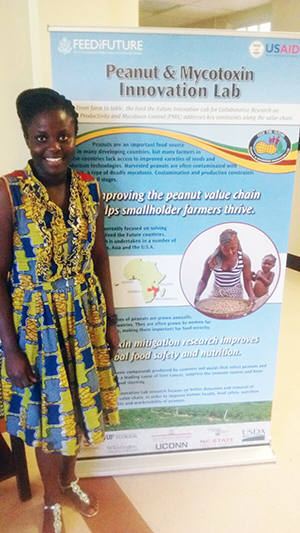Q&A with Esther Yeboah Akoto, MSc. Candidate: Aflatoxin Control Using Composting
By Emily Urban
University of Georgia, Peanut & Mycotoxin Innovation Lab

Background
Esther Akoto is an MSc student from Ghana mentored by Dr. Jinru Chen in the Department of Food Science & Technology at the University of Georgia, Griffin campus. She has been working on control of Aflatoxin contamination in peanuts using composting as part of the "Ghana Peanut Value Chain Interventions" project for the past year.
PMIL: Tell me about yourself and how your academic background has led you here.
Akoto: "I completed my undergraduate studies in Food Science and Technology at Kwame Nkrumah University of Science and Technology in Kumasi, Ghana, where the issues of food security within Ghana really came to my attention. One of my professors played a large role in influencing these interests, including food safety. I volunteered to be a teaching assistant while I was there, and when this opportunity to pursue an MSc became available, I was suggested as an ideal candidate for the position."
PMIL: What are you working on right now?
Akoto: "Right now I am working on developing a composting method to decontaminate discarded peanuts with high levels of aflatoxins. There is a need to find a better use of peanut shells as well. Unfortunately, when peanuts are discarded due to dangerous levels of aflatoxins, this toxin is re-introduced into the soil and the cycle of recontamination of the next peanut harvest continues. There is a need to find solutions that address this issue.
By using composting techniques, not only is it a method to reduce waste and secure food safety, it also is an affordable way to generate fertilizer. Rather than farmers buying expensive, synthetic fertilizers from outside sources, they have this low-cost, non-synthetic option.
Things are looking very optimistic so far! The preliminary tests were just completed, and after combining the highly aflatoxin contaminated peanut cake with the starter culture, and taking measurements every week (temperature, pH, and aflatoxin levels), there was nearly a four-fold decrease in aflatoxin levels in just three weeks. While this is just a preliminary test, we are ready to start scaling up and to determine the key stage where decontamination happens and the factors influencing that."
PMIL: How did you become interested in this? What impact do you hope  this project has?
this project has?
Akoto: "My focus is in the Food Sciences, but particularly food safety. While this project is not fully related to Food Science, we all consume peanuts and what we are studying is very important to food safety. My interest is to ensure Ghana and other developing countries consume ‘safe’ peanuts for good health.
Moreover, I want to help farmers. Most often the local farmers sell their products to local markets but improving the safety will also help them get a better premium from their products as they can export and also sell to bigger Food industries. The key is to not let science be an abstract idea, but instead, science needs to be combined with practice that is useful to farmers and consumers.
I ask, what can I do to meet people’s needs? What can I do to solve problems? Some of the things we are aiming for include higher incomes for our farmers, the increased ability to export, and the ability to provide enough food to eat at home.
We have to help our country and the problems at home. We have the opportunity to address these challenges and find solutions. There are three main questions here: (1) How are we helping farmers? (2) How are we insuring food safety? and (3) Are we meeting the consumer’s needs?"
PMIL: How has the opportunity to study outside your country impacted you?
Akoto: "I have gotten to meet so many different people from around the world, as many come from all over to study in the US. This has really opened my eyes to new perspectives, new solutions, and even future collaborators. Studying in the US helps you to discover different ways of solving a problem. You can match two ideas to address problems at home.
Sometimes at home (Ghana) we have a problem, such as the need to decontaminate Aflatoxin, but lack the equipment and resources to follow through. Here we have equipment and knowledge to do so. When we return home, we can use that knowledge and make use of what is available there. By learning the science or the key mechanism behind certain equipment/technology, it helps me to learn how to make things work and to be innovative.
After I complete my program next year, I plan to keep my focus on solving problems at home, like post-harvest losses."
PMIL: Do you have any advice to other students, particularly upcoming students?
Akoto: "One thing that I’d like to say to young scientists is to ‘persevere on’ and selflessness are the keys to help solve problems. We should put our country first and its problems, rather than our own self interests.
We have the opportunity of education, so now we have the responsibility to address the problems in our own country or our education would be in vain. It will remain in your head and no one benefits from it. It is good to have goals, but it should be based on helping people and solving problems."
PMIL would like to wish Esther the best of luck finishing her studies over the next year and looks forward to continuing to invest in our future young scientists.
Published February 27, 2015
